A coalition of patient, consumer, and public health groups have urged the FDA to require more rigorous testing before a medical device used for addressing complications from aneurysm treatments can be sold.
The FDA recently announced that it granted approval for a new device after a small study of only 10 women and 144 men, under a process that is not as rigorous as the process the law requires for devices that are life-saving or life-sustaining.
In a letter to FDA commissioner Margaret Hamburg, the groups maintain that the device should have been classified as high risk and subject to stricter testing because it is implantable and life sustaining, and would result in serious injury or death if it does not work correctly. The medical device in question is the endovascular suturing system, which is used in patients who have experienced complications following an endovascular graft used to treat aneurysms.
“This decision by FDA sets a bad precedent for approving new devices,” said Lisa McGiffert, director of Consumers Union’s Safe Patient Project. “Medical devices intended to save lives should require the FDA’s most rigorous safety testing. Bypassing such testing up front can put hundreds of thousands of patients at risk of serious harm, similar to what we have seen with recalled metal hips and surgical mesh.”
By law, high-risk devices are supposed to be reviewed through the FDA’s premarket approval process, which requires a comprehensive evaluation, including scientific clinical studies, to ensure the device’s safety and effectiveness. However, the FDA reviewed the device under the de novo process, which is intended for low and moderate risk medical devices that are not substantially similar to devices already on the market. The de novo process is not as rigorous as the process the law requires for devices that are life-saving or life-sustaining.
The FDA has been criticised by public health experts and consumer advocates because many medical devices have been recalled as potentially lethal after having been approved by the FDA without scientific clinical trials proving that the devices were safe or effective. In a scathing report issued last summer, the Institute of Medicine (IOM) urged the FDA to trash its current system, which approves more than 95% of medical devices on the basis that they are “substantially equivalent” to older medical products on the market. The IOM urged the FDA to instead require all devices to be proven safe and effective, and to rely more on a rarely used “de novo process” for determining the safety and effectiveness of devices that are low or moderate risk. The premarket approval process was to continue to be used for high-risk devices.
“FDA has responded to the Institute of Medicine’s recommendation by starting to beef up the de novo process, but instead of selecting a moderate risk device, as the law requires, the FDA inappropriately used the de novo review process for a device that is obviously intended to save lives. To get around the law, the FDA is claiming that the product is not life-saving and therefore does not need to be tested by rigorous clinical trials and inspections, as is required for life-saving devices,” explained Diana Zuckerman, president of the National Research Center for Women & Families.
The Coalition letter asks the FDA commissioner to rescind the agency’s approval of this product and instead require it to be reviewed through the more rigorous premarket approval process. In addition, it asks that the commissioner “provide an explanation of how these devices, which repair an aortic endograft, do not satisfy the criteria that the FDA sets for high-risk devices that they “sustain or support life, are implanted, or present potential unreasonable risk of illness or injury” if it were to fail.
The coalition letter has been signed by:
- American Medical Women’s Association
- Center for Medical Consumers
- Community Access National Network
- Consumers Union
- Jacobs Institute of Women’ Health
- National Consumers League
- National Research Center for Women & Families / Cancer Prevention and Treatment Fund
- National Women’s Health Network
- Our Bodies Ourselves
- Public Citizen
- US PIRG
- WoodyMatters













